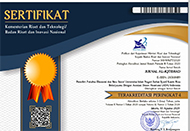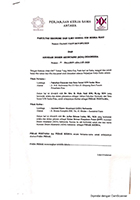THE EFFECT OF IMPLEMENTING INFORMATION TECHNOLOGY AND INNOVATION ON PERFORMANCE (Study on MSMEs in Rokan Hilir Riau Regency)
Abstract
The Covid-19 pandemic has greatly impacted MSMEs where many MSMEs have experienced a decline in performance and even closed. In the new normal era, MSMEs are slowly starting to rise, business actors are utilizing online media or the use of technology and innovating to boost sales again. The goal of the research is to analyze the impact of information technology and innovation on MSMEs performance in the Rokan Hilir Regency of Riau. There are 34,036 registered MSMEs in the Rokan Hilir regency, according to the Regency Office of Cooperatives and MSMEs. In contrast, the study's sample size was determined using the Slovin and criterion-based sampling methods, and it totaled 100 MSMEs. The information gathered is called "primary data," and it consists of questionnaires and interviews with a small number of MSMEs participants. The data was analyzed using a robust linear regression model. The findings of the research hypothesis indicate that information technology and innovation have a positive and significant impact on MSMEs performance. MSMEs will find it much simpler to market their products with the help of information technologies such as the use of online media, expanding the reach of their product sales. Similarly, innovative approaches to the products the company manufactures give it an edge over the competition and boost MSMEs performance.
Keywords
Full Text:
PDFReferences
Abebaw, W. K., Mulate, S., & Nigussie, L. (2018). Factors Affecting the Performance of Micro and Small Scale Enterprises: Experience from North Shewa Zone, Ethiopia. Journal of Investment and Management, 7(2), 70. https://doi.org/10.11648/j.jim.20180702.14
Al Mamun, A., & Fazal, S. A. (2018). Effect of entrepreneurial orientation on competency and micro-enterprise performance. Asia Pacific Journal of Innovation and Entrepreneurship, 12(3), 379–398. https://doi.org/10.1108/apjie-05-2018-0033
Ali, Hapzi & Wangdra, Tonny. (2010). Sistem Informasi Bisnis SI-Bis Dalam Prospektif Keunggulan Kompetitif. Baduose Media. Jambi.
Andresta, Qamarani Sandra. (2015). Pengaruh Penggunaan TI Terhadap Kinerja dan Daya Saing UKM Yang Menggunakan Internet di Payakumbuh.
Aslizadeh, A. (2014). Impact of Using Information Technology on Creating a Sustainable Competitive Advantage for Companies ; ( Case Study : Golestan Food Companies ). Indian Journal, 4, 1595–1603.
Bereket, Mamo Buli. (2017). Entrepreneurial orientation, market orientation and performance of SMEs in the manufacturing industry: evidence from Ethiopian enterprises Bereket. Management Research Review, 40(3).
Bryan Lukas, & O.C. Ferrell. (2000). The Effect of Market Orientation on Product Innovation. Journal of the Academy of Marketing Science, 28(2), 239–247.
Cho, Y. H., & Lee, J.-H. (2018). Entrepreneurial orientation, entrepreneurial education and performance. Asia Pacific Journal of Innovation and Entrepreneurship, 12(2), 124–134. https://doi.org/10.1108/apjie-05-2018-0028
Cicik Harini dan SB Handayani. (2019). Pemasaran Kewirausahaan Melalui E-Commerce Untuk Meningkatkan Kinerja Umkm. Derivatif Jurnal Manajemen, 3(2252), 58–66.
Cuevas-Vargas, H., Estrada, S., & Larios-Gómez, E. (2016). The Effects of ICTs As Innovation Facilitators for a Greater Business Performance. Evidence from Mexico. Procedia Computer Science, 91(Itqm), 47–56. https://doi.org/10.1016/j.procs.2016.07.040
Desmiyawati, Yusralaini, Ramaiyanti, S., & Azlina, N. (2022). The Utilization Of Digital Technology In Improving SMEs Performance In The New Normal Era, International Scientific Journal Theoretical & Applied Science, Issue: 10 Volume: 11, 26 Oct 2022, e-ISSN: 2409-0085
Ghozali, Imam. (2018). Aplikasi Analisis Multivariate dengan Program IBM SPSS
Hariadi, Humairoh, F., & Azlina, N. (2022). Msme Performance Effectiveness During Covid 19.
Lumpkin, G. T., & Dess, G. G. (1996). Clarifying The Entrepreneurial Orientation Construct And Linking It To Performance. The Academy of Management Review, 21(1), 135–172.
Muafil, & Roostika, R. (2014). Organizational Performance and Competitive Advantage Determinants of Creative SMEs. European Journal of Economics and Management, CXVI(February 2001), 1–53. http://www.ejemjournal.com/EJEM_2014_Vol.1_No.2.pdf
Ofori, D. (2015). Innovation and Knowledge Sharing: A New Competitive Advantage in the Mobile Telecommunication Industry in Ghana. Science Journal of Business and Management, 3(5), 157. https://doi.org/10.11648/j.sjbm.20150305.14
Ranto, D. W. P. (2016). Pengaruh orientasi Kewirausahaan terhadap kinerja UMKM bidang kuliner di Yogyakarta. Jurnal Bisnis, Manajemen, Dan Akuntansi, III(2), 1–11.
Rauch, A., Wiklund, J., Lumpkin, G. T., & Frese, M. (2009). Entrepreneurial orientation and business performance: An assessment of past research and suggestions for the future. Entrepreneurship: Theory and Practice, 33(3), 761–787. https://doi.org/10.1111/j.1540-6520.2009.00308.x
Rezaei, J., & Ortt, R. (2018). Entrepreneurial orientation and firm performance: the mediating role of functional performances. Management Research Review, 41(7), 878–900. https://doi.org/10.1108/MRR-03-2017-0092
Sekarsari, N. (2019). ICT dan Kinerja Organisasi : Peran Mediasi Inovasi. E-Jurnal Akuntansi, 28(3), 1948. https://doi.org/10.24843/eja.2019.v28.i03.p20
Sugiyono, (2017). Metode Penelitian Kuantitatif, Kualitatif dan R&D. Edisi 25. Bandung: Penerbit Alfabeta.
Susilatri, Azlina, N., & Desmiyawati. (2022). How To Improve The Performance Of Smes During The Covid 19 Pandemic. 19(2), 3084–3090.
DOI: http://dx.doi.org/10.24014/jiq.v19i1.22264
Refbacks
- There are currently no refbacks.














